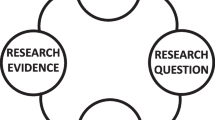Abstract
This paper won the 1983 Young Researcher Award competition sponsored by the Research and Theory Division of AECT. The award is given for the best report of an experimental descriptive or historical study in educational technology.
Similar content being viewed by others
References
Anderson, J. R. Arguments concerning representations for mental imagery.Psychological Review, 1978,85, 249–277.
Atkinson, R. C. Mnemonics in second language learning.American Psychologist, 1975,30, 821–828.
Atkinson, R. C., & Raugh, M. R. An application of the mnemonic keyword method to the acquisition of a Russian vocabulary.Journal of Experimental Psychology: Human Learning and Memory, 1975, 104, 126–133.
Bellezza, F. S. Mnemonic devices: Classification, characteristics, and criteria.Review of Educational Research, 1981,51, 247–275.
Bower, G. H. Imagery as a relational organizer in associative learning.Journal of Verbal Learning and Verbal Behavior, 1970, 9, 529–533.
Brainerd, C. J., Desrochers, A., & Howe, M. L. Stages-of-learning analysis of picture-word effects in associative memory.Journal of Experimental Psychology: Human Learning and Memory, 1981, 7, 1–14.
Campbell, D. T., & Stanley, J. C.Experimental and quasi-experimental designs-for-research. Chicago: Rand McNally, 1966.
Clark, R. E. Instrucitonal methods: Operational definitions and criterial attributes. Paper presented at the Annual Meeting of the American Educational Research Association, New York, 1982.
Clark, R. E. Reconsidering research on learning from media.Review of Educational Research, 1983,53 (4), 445–459.
Cronbach, L. J., & Snow, R. E.Aptitudes and instructional methods: A handbook for research on interactions. New York: Irvington, 1977.
Garton, J. A., & Blick, K. A. Retention of word pairs for experimenter-supplied and subject-originated mnemonics.Psychological Reports, 1974,35, 1099–1140.
Higbee, K. L. Recent research on visual mnemonics: Historical roots and educational fruits.Review of Educational Research, 1979,49, 611–629.
Kee, D. W., & Rohwer, W. D., Jr. Response and associative phase components of elaborative prompts in children’s noun-pair learning.Journal of Experimental Psychology, 1974,18, 62–71.
Levin, J. R. The mnemonic 80s: Keywords in the classroom.Educational Psychologist, 1981,16, 65–82.
Levin, J. R., McCormick, C. B., Miller, G. E., Berry, J. K., & Pressley, M. Mnemonic versus nonmnemonic vocabulary-learning strategies for children.American Educational Research Journal, 1982,19, 121–136.
Martin, E. Stimulus meaningfulness and paired-associate transfer: An encoding variability hypothesis.Psychological Review, 1968,75, 421–441.
McCarty, D. L. Investigation of a visual imagery mnemonic device for acquiring face-name associations.Journal of Experimental Psychology: Human Learning and Memory, 1980, 6, 145–155.
Melton, A. W. Repetition and retrieval from memory.Science, 1967,158, 532.
Miller, G. E., Levin, J. R., & Pressley, M. An adaptation of the keyword method to children’s learning of verbs.Journal of Mental Imagery, 1980, 4, 57–61.
Ott, C. E., Butler, D. C., Blake, R. S., & Ball, J. P. The effect of interactive image elaboration on the acquisition of foreign vocabulary.Language Learning, 1973, 23, 197–206.
Paivio, A. & Foth, D. Imaginal and verbal mediators and noun concreteness in paired-associate learning: The elusive interaction.Journal of Verbal Learning and Verbal Behavior, 1970,9, 384–390.
Pressley, M. Children’s use of the keyword method to learn simple Spanish vocabulary words.Journal of Educational Psychology, 1977,69, 465–472.
Pressley, M., & Levin, J. R. Developmental constraints associated with children’s use of the keyword method of foreign language vocabulary learning,journal of Experimental Child Psychology, 1978,26, 359–372.
Pressley, M., & Levin, J. R. The keyword method and recall of vocabulary words from definitions.Journal of Experimental Psychology: Human Learning and Memory, 1981, 7, 72–76.
Pressley, M., Levin, J. R., & Delaney, H. D. The mnemonic keyword method.Review of Educational Research, 1982,52, 61–91.
Pressley, M., Levin, J. R., Hall, J. W., Miller, G. E., & Berry, J. K. The keyword method and foreign word acquisition.Journal of Experimental Psychology: Human Learning and Memory, 1980,6, 163–173.
Pressley, M., Levin, J. R., Kuiper, N. A., Bryant, S. L., & Michener, S. Mnemonic versus non-mnemonic vocabulary-learning strategies: Additional comparisons.Journal of Educational Psychology, 1982,74, 693–707.
Pressley, M., Levin, J. R., & Miller, G. E. How does the keyword method affect vocabulary comprehension and usage?Reading Research Quarterly, 1981,16, 213–226.
Pressley, M., Levin, J. R., & Miller, G. E. The keyword method compared to alternative vocabulary-learning strategies.Contemporary Educational Psychology, 1982, 7, 50–60.
Rohwer, W. D., Jr. Images and pictures in children’s learning: Research results and educational implications.Psychological Bulletin, 1970,73, 393–403.
Rohwer, W. D., Jr. Elaboration and learning in childhood and adolescence. In H. W. Reese (Ed.),Advances in child development and behavior (Vol. 8). New York: Academic Press, 1973.
Shimmerlick, S. M. Organization theory and memory for prose: A review of the literature.Review of Educational Research, 1978,48, 103–120.
Tulving, E. Relation between encoding specificity and levels of processing. In L. S. Cermak and F. I. M. Craik (Eds.),Levels of processing and human-memory, Hillsdale, N. J.: Lawrence Erlbaum Associates, 1978.
Underwood, B. J., Runquist, W. N., & Schulz, R. W. Response learning in paired-associate lists as a function of intralist similarity.Journal of Experimental Psychology, 1959,58, 70–78.
Underwood, B. J., & Schulz, R. W.Meaningfulness and verbal learning. Philadelphia: Lippincott, 1960.
Winn, W. Visualization in learning and instruction: A cognitive approach.Educational Communication and Technology Journal, 1982, 30(1), 3–25.
Author information
Authors and Affiliations
Additional information
This paper was submitted while the author was a doctoral candidate in the Department of Educational Psychology and Technology, University of Southern California, Los Angeles, CA 90007.
Rights and permissions
About this article
Cite this article
Ho, HK. Two experiments on the effects of mnemonic strategies: Is it mode or cognitive function that influences learning?. ECTJ 32, 89–100 (1984). https://doi.org/10.1007/BF02766668
Issue Date:
DOI: https://doi.org/10.1007/BF02766668




